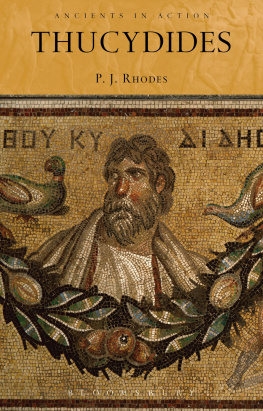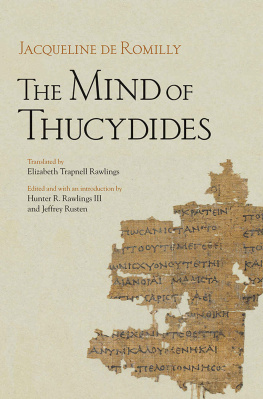Thucydides - History of the Peloponnesian War
Here you can read online Thucydides - History of the Peloponnesian War full text of the book (entire story) in english for free. Download pdf and epub, get meaning, cover and reviews about this ebook. year: 2007, publisher: Penguin Books Ltd, genre: History. Description of the work, (preface) as well as reviews are available. Best literature library LitArk.com created for fans of good reading and offers a wide selection of genres:
Romance novel
Science fiction
Adventure
Detective
Science
History
Home and family
Prose
Art
Politics
Computer
Non-fiction
Religion
Business
Children
Humor
Choose a favorite category and find really read worthwhile books. Enjoy immersion in the world of imagination, feel the emotions of the characters or learn something new for yourself, make an fascinating discovery.

- Book:History of the Peloponnesian War
- Author:
- Publisher:Penguin Books Ltd
- Genre:
- Year:2007
- Rating:5 / 5
- Favourites:Add to favourites
- Your mark:
- 100
- 1
- 2
- 3
- 4
- 5
History of the Peloponnesian War: summary, description and annotation
We offer to read an annotation, description, summary or preface (depends on what the author of the book "History of the Peloponnesian War" wrote himself). If you haven't found the necessary information about the book — write in the comments, we will try to find it.
History of the Peloponnesian War — read online for free the complete book (whole text) full work
Below is the text of the book, divided by pages. System saving the place of the last page read, allows you to conveniently read the book "History of the Peloponnesian War" online for free, without having to search again every time where you left off. Put a bookmark, and you can go to the page where you finished reading at any time.
Font size:
Interval:
Bookmark:

HISTORY OF THE PELOPONNESIAN WAR
ADVISORY EDITOR: BETTY RADICE
THUCYDIDES the son of Olorus was born probably about 460 B.C. and died about the year 400 B.C. When the Peloponnesian War broke out in 431 B.C. Thucydides probably took part in some of its early actions. Some time between 430 and 427 he fell ill of the plague, but recovered. In 424 he was appointed general, but his small squadron of ships arrived too late to save the important Athenian colony of Amphipolis from the Spartan commander Brasidas, though he successfully held the nearby port of Eion against Brasidas attacks. In consequence he was exiled, not returning until twenty years had passed, only to die a few years later.
For much of the period he describes The Peloponnesian War is the only source that survives. The verity of his reports and the justice of his perceptions have been the cause of controversy amongst scholars for centuries. But it is certain that he used his historical imagination to reconstruct only as a last resort. When the various parts of the history were composed, which of these he revised, and whether their chronological inconsistencies are due to later editing these questions are still unsolved.
REX WARNER was University Professor of the University of Connecticut from 1964 until his retirement in 1974. He was born in 1905 and was a classical scholar of Wadham College, Oxford. He wrote poems, novels and critical essays, and translated many works, of which Xenophons History of My Time and The Persian Expedition, Plutarchs Lives (under the title Fall of the Roman Republic) and Moral Essays have been published in Penguin Classics. Rex Warner died in 1986.
M. I. FINLEY took his M.A. and Ph.D. at Columbia University and was appointed a lecturer in Classics at Cambridge in 1955. From 1970 to 1979 he was Professor of Ancient History at Cambridge, and from 1976 to 1982 Master of Darwin College, Cambridge. He received a knighthood in 1979. Among his books the following are published in Penguin: The World of Odysseus, The Ancient Greeks, Aspects of Antiquity, Ancient Slavery and Modern Ideology and Economy and Society in Ancient Greece. He died in 1986.
THUCYDIDES
*
*
Translated by Rex Warner
with an Introduction and Notes
by M. I. Finley
PENGUIN BOOKS
PENGUIN BOOKS
Published by the Penguin Group
Penguin Books Ltd, 80 Strand, London WC2R 0RL, England
Penguin Putnam Inc., 375 Hudson Street, New York, New York 10014, USA
Penguin Books Australia Ltd, 250 Camberwell Road, Camberwell, Victoria 3124, Australia
Penguin Books Canada Ltd, 10 Alcorn Avenue, Toronto, Ontario, Canada M4V 3B2
Penguin Books India (P) Ltd, 11 Community Centre, Panchsheel Park, New Delhi 110 017, India
Penguin Books (NZ) Ltd, Cnr Rosedale and Airborne Roads, Albany, Auckland, New Zealand
Penguin Books (South Africa) (Pty) Ltd, 24 Sturdee Avenue, Rosebank 2196, South Africa
Penguin Books Ltd, Registered Offices: 80 Strand, London WC2R 0RL, England
www.penguin.com
This translation first published 1954
Revised with a new introduction and appendices 1972
53
Translation copyright 1954 by Rex Warner
Introduction and appendices copyright M. I. Finley, 1972
All rights reserved
Except in the United States of America, this book is sold subject
to the condition that it shall not, by way of trade or otherwise, be lent,
re-sold, hired out, or otherwise circulated without the publishers
prior consent in any form of binding or cover other than that in
which it is published and without a similar condition including this
condition being imposed on the subsequent purchaser
THE fame of ancient wars is commonly fashioned by myth and romance. Helen of Troy, the pass of Thermopylae, Alexander, Hannibal these are the people and the incidents that keep wars alive in popular imagination. But not so the Peloponnesian War (as we call it), fought between Athens and Sparta from 431 to 404, with a scarcely honoured seven-year peace in the middle. That war lives on not so much for anything that happened or because of any of the participants, but because of the man who wrote its history, Thucydides the Athenian. No other historian can match this achievement; no other war, or for that matter no other historical subject, is so much the product of its reporter.
That is achievement enough. It becomes even greater when we look more closely at the man and his book. All that we know about Thucydides is found in the few scraps he tells us himself, and in a short, eccentric and unreliable biography from late antiquity credited to someone named Marcellinus. Clearly he was a humourless man, pessimistic, sceptical, highly intelligent, cold and reserved, at least on the surface, but with strong inner tensions which occasionally broke through the impersonal tone of his writing in savage whiplash comments, such as Hyperbolus, a wretched character, who had been ostracized, not because anyone was afraid of his power and prestige, but because he was a thoroughly bad lot and a disgrace to the city (VIII, 73). He wrote in a complicated style, overloaded and lacking in charm. Not that he was indifferent to language and its nuances; on the contrary, correct use of language was for him a moral question, its debasement a symptom of moral breakdown. Summing up the consequences of stasis (civil war), he wrote:
To fit in with the change of events, words, too, had to change their usual meanings. What used to be described as a thoughtless act of aggression was now regarded as the courage one would expect to find in a party member; to think of the future and wait was merely another way of saying one was a coward; any idea of moderation was just an attempt to disguise ones unmanly character; ability to understand a question from all sides meant that one was totally unfitted for action (III, 82).
In his struggle to convey the sense of an action or a statement precisely, Thucydides juggled tenses in a sophisticated way, piled up subordinate clauses and resorted to other devices that are often the despair of modern readers. (A surprising proportion of commentaries is given over to sorting out just what Thucydides was trying to say in any particular passage.) Neither in style nor in treatment of his subject did he make the slightest concession to his audience. Nothing mattered but the events and the issues; these he would get right by dedicated effort, by devotion to accuracy and understanding, and he would report his findings without adornment.
And it may well be that my history will seem less easy to read because of the absence in it of a romantic element (to mythodes). It will be enough for me, however, if these words of mine are judged useful by those who want to understand clearly the events which happened in the past and which (human nature being what it is) will, at some time or other and in much the same ways, be repeated in the future. My work is not a piece of writing designed to meet the needs of an immediate public, but was done to last for ever (I, 22).
Thucydides was a young man, probably in his late twenties, when the war began. It is a guess that he was born about 460 B.C., but a good guess. He had to be old enough to hold the office of strategos (general) in 424, for which the minimum age was probably thirty, and at the same time young enough to warrant the rather defensive remark he inserted in what is now conventionally known as the Second Introduction:
I myself remember that all the time from the beginning to the end of the war it was being put about by many people that the war would last thrice nine years. I lived through the whole of it,
Font size:
Interval:
Bookmark:
Similar books «History of the Peloponnesian War»
Look at similar books to History of the Peloponnesian War. We have selected literature similar in name and meaning in the hope of providing readers with more options to find new, interesting, not yet read works.
Discussion, reviews of the book History of the Peloponnesian War and just readers' own opinions. Leave your comments, write what you think about the work, its meaning or the main characters. Specify what exactly you liked and what you didn't like, and why you think so.









